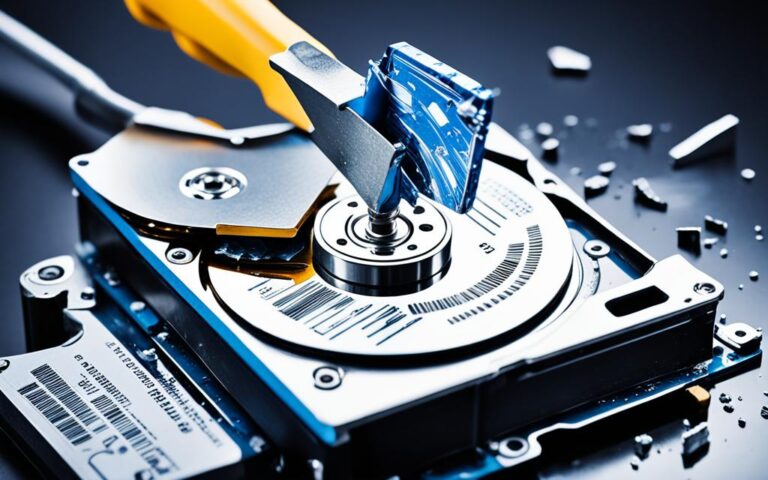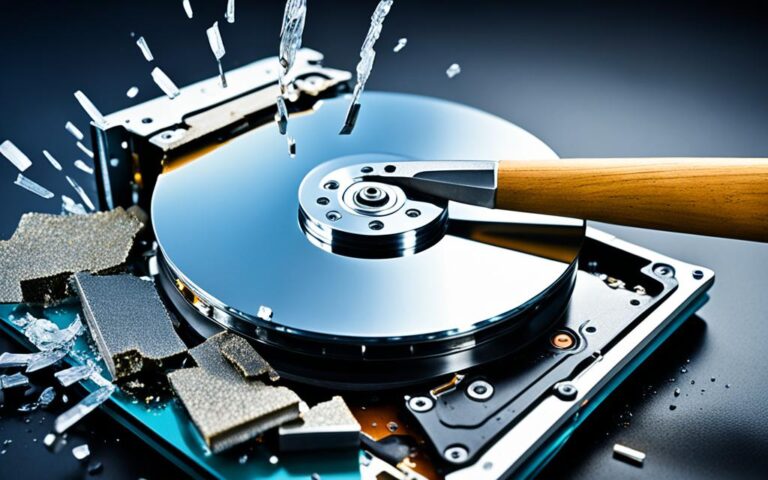Selecting the Right Data Destruction Partner: A Checklist for Businesses
When it comes to secure file destruction, selecting the right data destruction partner is crucial for businesses. Entrusting a reliable provider ensures the confidentiality and security of your sensitive information. But how do you choose the right one? This checklist will guide you through the important factors to consider in selecting a data destruction provider.
First and foremost, look for a provider that offers comprehensive data destruction services. They should be experts in both physical destruction and data sanitization, offering secure methods for complete data eradication. Verify if they are an insured data destruction provider, providing you with peace of mind and protection.
Confidentiality is key in data destruction. Ensure that the provider operates with a confidentiality agreement, guaranteeing the protection of your sensitive data throughout the process. Additionally, request a Certificate of Data Destruction as proof that your data has been completely and securely destroyed.
The chain of custody is another critical aspect to consider. A reliable provider should have a clear and documented chain of custody, ensuring that your assets are handled securely and responsibly from pickup to final destruction.
Consistent documentation is essential for proper tracking and compliance. The provider should have a consistent documentation approach, providing detailed reports and records of the data destruction process.
Packing and shipping logistics are also important factors to consider. The provider should be experienced in packing and shipping hardware securely, minimizing the risk of damage or data loss during transit.
Physical destruction verification is crucial for complete peace of mind. Ensure that the provider offers a method for physically verifying the destruction of your hardware, providing you with tangible proof that your data cannot be recovered.
By following this checklist, you can confidently select a data destruction partner that meets your specific security and confidentiality requirements. Protect your business data and ensure responsible and secure file destruction.
Benefits of On-Site Data Destruction Services
On-site data destruction services provide significant advantages for businesses concerned about data security. By opting for on-site data destruction, businesses can mitigate the risk of data breaches during transit. This service involves the provider decommissioning, disassembling, and preparing equipment for shipping at the client’s location, ensuring that sensitive data remains secure throughout the process.
One of the key benefits of on-site data destruction is the ability for businesses to maintain control over their data. By having the destruction process carried out on-site, organizations can oversee the entire operation, reducing the risk of data breaches that may occur during transportation to off-site facilities. This level of control and oversight is crucial in safeguarding sensitive information and maintaining compliance with data protection regulations.
On-site data destruction services offer businesses peace of mind, ensuring confidential data remains secure throughout the destruction process.
Another advantage of on-site data destruction is the opportunity to work with a provider who can provide a comprehensive project plan. A well-crafted project plan outlines clear responsibilities and timelines, minimizing any disruption to the live environment. This ensures that businesses can continue their operations without compromising data security.
Working during off-peak hours within a live data center is another important aspect of on-site data destruction. By scheduling the destruction process during off-peak hours, businesses can minimize any impact on daily operations. This approach allows for maximum efficiency and reduces the risk of disrupting critical business activities.
When selecting a data destruction partner, it is essential to consider their track record of work in data centers. A provider with a proven track record demonstrates their expertise and ability to execute data destruction processes effectively. This instills confidence in their ability to handle sensitive information securely and ensures a smooth and successful data destruction experience for businesses.
Overall, on-site data destruction services offer a tailored and secure solution for businesses seeking the utmost data security. With control over the destruction process, comprehensive project planning, off-peak hour flexibility, and a track record of data center work, businesses can confidently safeguard their data and protect their reputation.
| Benefits of On-Site Data Destruction Services | Keywords |
|---|---|
| Enhanced data security | Data security, Data breaches |
| Control over the destruction process | Data security |
| Comprehensive project planning | Project plan |
| Minimal disruption to live environment | Off-peak hours |
| Proven track record in data center work | Track record of data center work |
Ensuring Data Destruction Compliance
When choosing a data destruction provider, it’s crucial to ensure compliance with corporate and regulatory requirements. Here are key factors to consider:
Data Destruction Methods
Enquire about the provider’s data destruction methods. Verify their capability to handle various storage media, including magnetic hard drives, solid state drives, flash storage, and storage area networks (SANs).
Hard Drive Erasure Services
Ask if the provider offers hard drive erasure services. This method securely removes all data from the hard drives, making it unrecoverable.
Volume Requirements
Check if the provider can meet your volume requirements for data destruction. Whether you have a small number or a large volume of storage media, ensure they have the capacity and resources to handle your needs.
Data Destruction Reporting
Request documentation and reports that demonstrate their compliance with regulations and industry best practices. This includes records of the data destruction process, verification of erasure or destruction, and any relevant certifications.
Chain of Custody
Verify how the provider ensures a secure chain of custody for IT assets once they are removed from the data center. This ensures that there are no gaps or unauthorized access to the equipment during transportation and destruction.
Compliance with Regulations
Confirm that the provider complies with relevant regulations, such as the General Data Protection Regulation (GDPR). This ensures that your data destruction practices align with legal requirements and protect against potential penalties.
Legislative Audit
If a legislative audit is a concern for your business, make sure the data destruction provider has experience in handling audits and can provide the necessary documentation and evidence to satisfy auditing requirements.
Compliance with regulations and consistent, accurate reporting are vital in demonstrating responsible data destruction practices.
By considering these factors and conducting thorough assessments of data destruction providers, you can ensure compliance with regulations and protect the confidentiality and security of your business data.
The Importance of Sustainability in Secure File Destruction
Sustainable practices play a crucial role in secure file destruction. Many companies aim to reduce their environmental impact by prioritizing sustainability goals. One of the key aspects of sustainable file destruction is the circular economy, which emphasizes the reuse and recycling of IT assets to minimize waste.
When selecting a data destruction partner, it is essential to consider their approach to minimizing environmental impact. Look for a provider that emphasizes the reuse and recycling of retired IT assets. By reselling decommissioned equipment, companies can offset project costs and reduce the total cost of IT ownership.
Maximizing Resale Value and Unique Processing Capabilities
Choosing a provider that has the capability to sell a full range of data equipment profitably is crucial. They should have the expertise to maximize the resale value of assets, offering unique processing capabilities to optimize value recovery.
Reselling decommissioned IT assets not only benefits companies financially but also contributes to sustainability goals. It helps minimize landfill volumes and decreases the need for mining natural resources, as the equipment finds new life in the market.
Recycling Obsolete Electronics and Responsible Practices
Recycling obsolete electronics is another essential aspect of sustainable file destruction. By properly recycling these electronics, companies can further minimize their environmental impact.
When selecting a data destruction partner, ensure that they have proper recycling certifications and can provide proof that no hazardous material is sent to the landfill. Responsible recycling practices support sustainability goals and help mitigate environmental risks.
By prioritizing sustainability in secure file destruction, businesses contribute to the circular economy and demonstrate their commitment to minimizing environmental impact. It is crucial to choose a data destruction partner that aligns with these values and can help organizations achieve their sustainability goals while securely managing and disposing of their data assets.
The Role of Resale in Secure File Destruction
Reselling decommissioned IT assets is an effective strategy for businesses to offset project costs and maximize the value of their IT investments. By selling component parts or complete assets, companies can recover a significant portion of their initial investment, reducing the overall cost of IT ownership.
When evaluating a data destruction partner, it is crucial to consider their expertise in reselling a wide range of data equipment profitably. Look for a provider who has experience in the secondary markets, understands current market trends, and has a global market presence. These factors are particularly important as they contribute to maximizing the resale value of IT assets.
Partnering with a data destruction provider who can sell both complete assets and individual components ensures that you can extract the maximum value from your retired IT equipment. The ability to sell component parts can be especially beneficial for equipment with higher-value components that retain their market demand even after decommissioning.
Quotes
“Reselling decommissioned IT assets is a strategic approach to minimize the financial burden of project costs and recoup value from retired equipment.”
Furthermore, the data destruction partner’s connections in the secondary markets play a crucial role in optimizing the financial outcome. A well-established network of buyers and industry relationships enhances the chances of securing higher resale values for your assets.
It is important to note that reselling IT assets is a specialized field that requires in-depth knowledge and experience. Therefore, partnering with a data destruction provider who is experienced in the secondary markets ensures that your assets will be showcased to the right buyers, resulting in better resale values.
To illustrate the significance of resale in secure file destruction, consider the following table that showcases the potential financial impact of reselling decommissioned IT assets:
| Resale Strategy | Financial Impact |
|---|---|
| Reselling complete assets | Offset project costs significantly and recover a substantial portion of the initial investment. |
| Reselling component parts | Optimize the value recovery by targeting high-demand components and maximizing resale prices. |
By integrating resale as a core component of your secure file destruction process, you can effectively manage costs and generate revenue from your retired IT assets. This approach ensures that your decommissioned equipment does not go to waste and contributes to a circular economy.
The Benefits of Resale in Secure File Destruction:
- Offset project costs and reduce the overall cost of IT ownership.
- Maximize the value recovery of decommissioned IT assets.
- Sell both complete assets and component parts to optimize financial outcomes.
- Partner with a provider experienced in secondary markets for better resale values.
By recognizing the role of resale in secure file destruction and selecting a data destruction partner with proven expertise in reselling decommissioned IT assets, you can unlock financial value from your retired equipment and contribute to a more sustainable IT lifecycle.
Responsible Electronics Recycling Practices
Proper disposal of obsolete and broken equipment is a critical part of responsible electronics recycling. It is important to choose a data destruction partner who follows certified recycling operations to ensure environmentally-friendly practices. Here are key considerations when evaluating a provider:
- Obsolete Equipment Disposal: Inquire about how the provider handles and disposes of obsolete and broken equipment to prevent improper disposal.
- Certified Recycling Operations: Check if the provider’s recycling operations are certified to industry standards, such as ISO 14001, for ensuring responsible recycling practices.
- Insurance Coverage: Ensure the provider has appropriate insurance coverage, including pollution liability coverage, to safeguard against any environmental risks associated with recycling operations.
- Hazardous Material-Free Landfill: Request proof that no hazardous material is sent to the landfill, ensuring the responsible handling of potentially harmful substances.
- Prevention of Illegal E-Waste Export: Confirm that the provider has an audit trail in place to prevent the illegal export of e-waste, contributing to global efforts to combat electronic waste trafficking.
Responsible Electronics Recycling Table
| Considerations | Benefits |
|---|---|
| Obsolete Equipment Disposal | Prevent improper disposal of equipment and minimize environmental impact. |
| Certified Recycling Operations | Ensure compliance with industry standards and responsible recycling practices. |
| Insurance Coverage | Safeguard against environmental risks and liabilities associated with recycling operations. |
| Hazardous Material-Free Landfill | Minimize the release of hazardous substances into the environment. |
| Prevention of Illegal E-Waste Export | Contribute to global efforts to combat electronic waste trafficking and protect communities. |
By choosing a data destruction partner with responsible recycling practices, you play an active role in minimizing environmental impact, complying with regulations, and fostering sustainable electronic waste management.
Core Service Capabilities to Consider
Understanding the core service capabilities of a data destruction partner is crucial in selecting the right provider. When evaluating potential partners, there are several key factors to consider:
1. Equipment Value Assessment
A reliable data destruction provider should have the ability to accurately assess the value of your equipment. This includes evaluating both end-user computing devices and enterprise IT equipment. By partnering with a provider that can accurately determine the value of your assets, you can maximize the potential return on your investment.
2. Testing and Repair Capabilities
It is important to choose a provider with strong testing and repair capabilities. This ensures that any equipment that can be repaired and reused is not unnecessarily discarded. By maximizing the value of your equipment through repair and reuse, you can reduce waste and contribute to a more sustainable approach to data destruction.
3. Resale Process Proficiency
The resale process is a crucial aspect of secure file destruction. Look for a provider with expertise and proficiency in connecting with the right customers and maximizing the resale value of your IT assets. A provider with a well-established network and knowledge of the secondary market can optimize the financial outcome of the secure file destruction process.
4. End-User Computing vs. Enterprise IT Equipment
Consider the provider’s experience and specialized capabilities in handling both end-user computing devices and enterprise IT equipment. Enterprise IT equipment requires specific expertise due to its complexity and unique requirements. Partnering with a provider experienced in handling enterprise-level equipment ensures that your data destruction needs are effectively met.
By considering these core service capabilities, you can select a data destruction partner that best aligns with your specific equipment and project requirements, maximizing value and ensuring a secure and reliable data destruction process.
| Core Service Capabilities | Key Considerations |
|---|---|
| Equipment Value Assessment | Accurate assessment of equipment value |
| Testing and Repair Capabilities | Strong testing and repair capabilities to maximize equipment value |
| Resale Process Proficiency | Expertise in connecting with customers and maximizing resale value |
| End-User Computing vs. Enterprise IT Equipment | Specialized capabilities in handling both types of equipment |
A data destruction provider with comprehensive equipment value assessment, testing and repair capabilities, resale process proficiency, and expertise in handling end-user computing and enterprise IT equipment can significantly enhance the data destruction process and provide maximum value for your business.
Conclusion
Choosing the right data destruction partner is crucial for safeguarding the security and confidentiality of your business data. By following the checklist provided in this article, you can identify a provider that meets your specific requirements and industry standards.
Consider the benefits of on-site data destruction services, which eliminate the risk of data loss during transit, ensuring maximum security. Compliance with data destruction regulations is vital to avoid legal consequences and protect your business’s reputation.
Furthermore, sustainability and resale should be key factors in your decision-making process. Look for a provider that supports responsible electronics recycling practices, minimizing environmental impact and promoting the circular economy. Reselling decommissioned IT assets not only offsets project costs but also reduces the total cost of IT ownership.
Evaluate the core service capabilities of potential partners in data destruction, including their ability to handle different types of equipment and their expertise in resale. By making an informed decision and selecting the right data destruction partner, you can confidently protect your business data and contribute to environmentally responsible practices in the secure file destruction process.
FAQ
What factors should I consider when selecting a data destruction partner?
When selecting a data destruction partner, it is crucial to consider factors such as their compliance with data privacy laws and methods (NAID AAA Certification), onsite data destruction services, complete reporting and documentation, erasure and physical destruction verification methods, trained and vetted technicians, proper insurance coverage, and expertise in packing, shipping, and logistics.
What are the benefits of on-site data destruction services?
On-site data destruction services offer benefits such as avoiding the risk of data breaches during transit, decommissioning and disassembling equipment on-site, minimizing disruption to live environments with a clear project plan, and working during off-peak hours in live data centers to minimize impact on daily operations.
What should I inquire about regarding data destruction methods?
When evaluating a data destruction provider, inquire about their data destruction methods and their ability to handle a range of storage media, such as magnetic hard drives, solid state drives, flash storage, and storage area networks (SANs). Additionally, check if they can meet your volume requirements and provide documentation and reports that demonstrate compliance with corporate and regulatory requirements.
How important is sustainability in the secure file destruction process?
Sustainability plays a crucial role in secure file destruction. Look for a provider that supports sustainability goals by reusing and recycling retired IT assets, maximizing the resale value of assets, and recycling obsolete electronics to minimize environmental impact and ensure compliance with environmental regulations.
How can reselling decommissioned IT assets benefit my business?
Reselling decommissioned IT assets can offset project costs and reduce the overall cost of IT ownership. By choosing a provider with strong resale capabilities, you can maximize the resale value of IT assets, sell both complete assets and component parts, and leverage their connections in secondary markets for optimal financial outcomes.
What should I consider when it comes to responsible electronics recycling practices?
Proper disposal of obsolete and broken equipment is important in responsible electronics recycling. Inquire about how the provider handles and disposes of such equipment, including if they subcontract the recycling process and how they vet and manage subcontractors. Verify if their recycling operations are certified to industry standards and if they have appropriate insurance coverage and a no-hazardous material sent to landfill policy.
What are the core service capabilities I should look for in a data destruction partner?
When selecting a data destruction partner, assess their ability to accurately assess the value of your equipment, their testing and repair capabilities, their proficiency in the resale process, and their experience in handling both end-user computing devices and enterprise IT equipment.
How can I choose the right data destruction partner?
To choose the right data destruction partner, follow the checklist provided in this article. Consider factors such as secure file destruction, benefits of on-site data destruction services, compliance with data destruction regulations, sustainability and resale capabilities, responsible electronics recycling practices, and core service capabilities. By making an informed decision, you can protect your business data and contribute to environmentally responsible practices.













